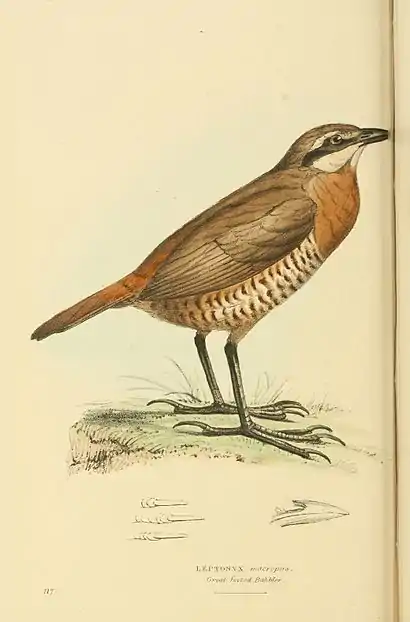LEPTONYX macropus.
Great footed Babbler.

LEPTONYX macropus
Great-footed Babbler.
Family Merulidæ. Sub-family Crateropodinæ. Genus Malacocircus, Sw. Sub-genus Leptonix. (The Rasorial type.) Nob.
Sub-generic Character.
Feet of extraordinary size and thickness, all the anterior toes of nearly equal length; the claws long, slender, and but slightly curved. Tail slightly rounded, of fourteen feathers. Wings very short.
Specific Character.
Above brown beneath whiteish, with transverse undulated lines; breast and rump, rufous brown; chin, stripe above and beneath the eye, whiteish.
For the use of this new and singularly formed bird, we are indebted to Professor Hooker, who, with his usual liberality, has recently sent for our inspection, a valuable box of Chilian birds, most of which are undescribed. They form the foundation of his son's, Mr William Hooker's collection, who has already commenced with much zeal the study of this interesting science.
All the rasorial characters are strikingly displayed in this extraordinary type; which exhibits the greatest developement of the foot of any insessorial bird yet discovered. It no doubt lives entirely upon the ground; for the feet are formed precisely on the same model as those of Menura and Orthonyx, both of which are the rasorial types of their respective circles, and are consequently representatives of Leptonyx: the same analogy explains its resemblance to a partridge, and more distantly to the sub-genus Erythaca Sw. by its rufous breast.
The Indian bird erroneously called Pitta thoracica by M. Temminck, follows this in close affinity, and is either the Grallatorial type, or the immediate point of connection between Malacocircus Sw. and Timalia Horsf.
Total length 9 inches; bill from the gape 11⁄10; wings 4; tail 3; tarsus 1¾; hind toe and claw 1½.